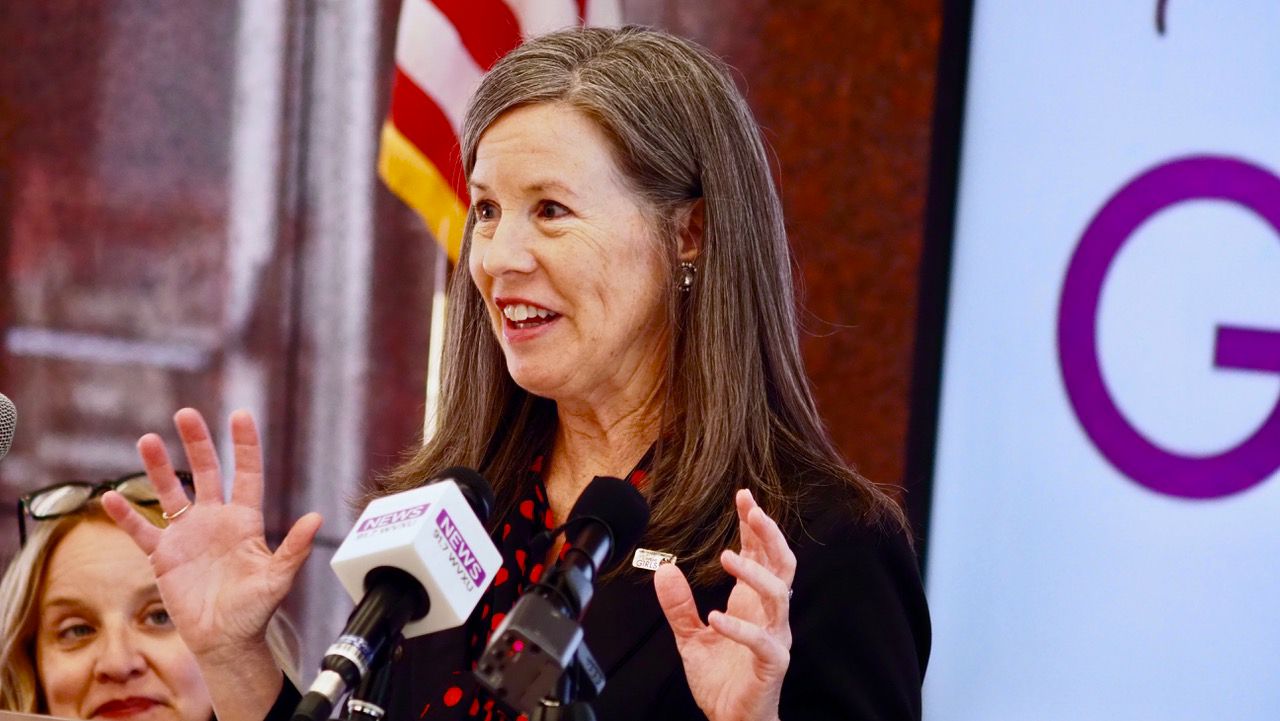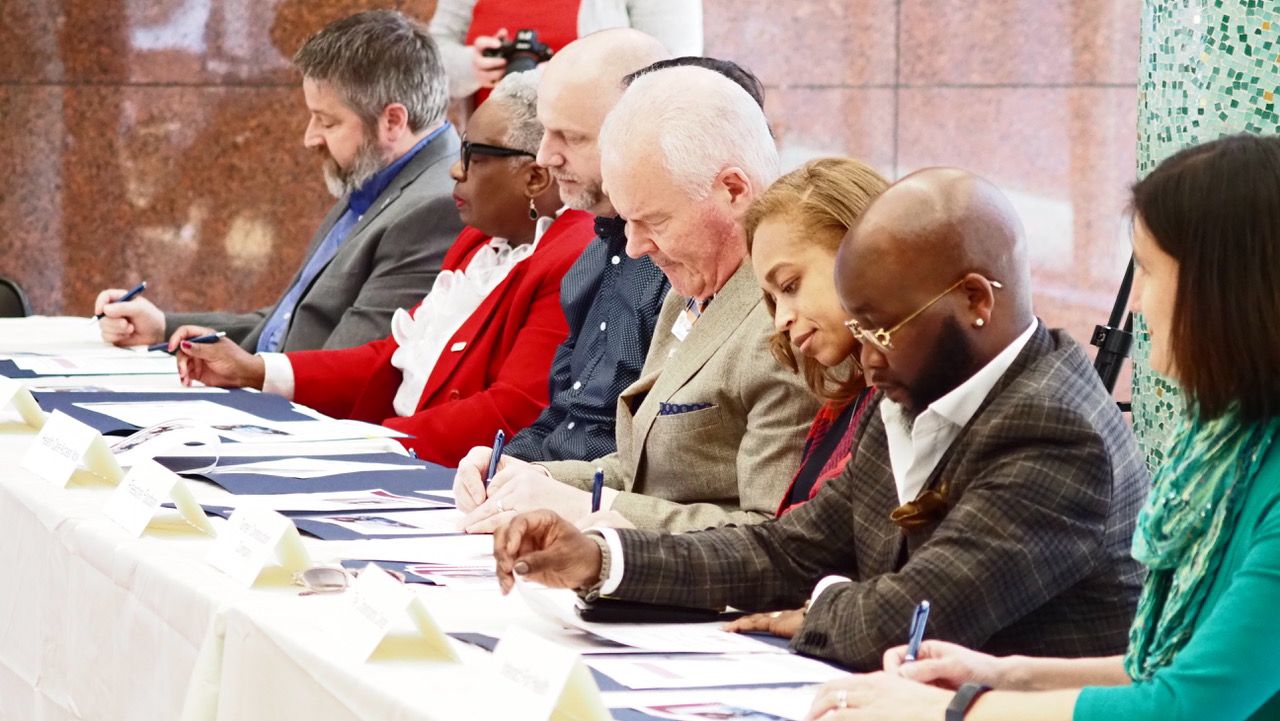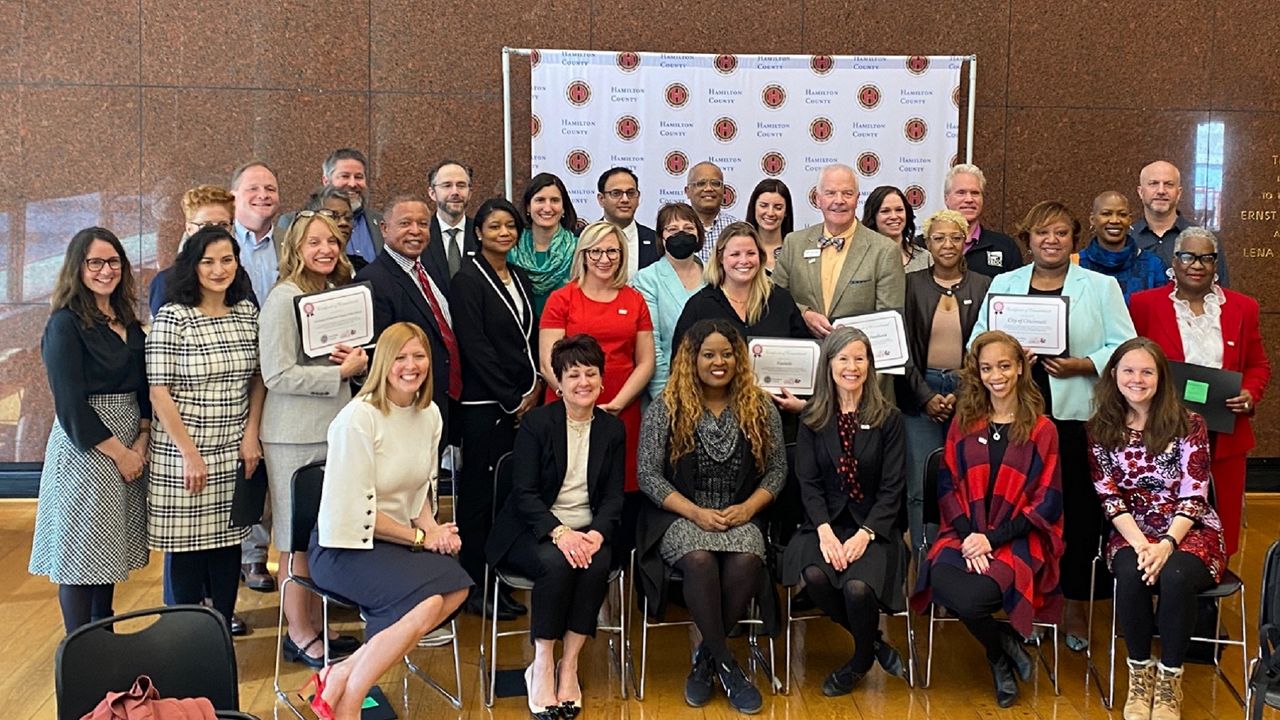CINCINNATI – Inequities in pay rates is an issue across the country, but a group in Hamilton County is working to change that.
What You Need To Know
- Dozens of Hamilton County organizations signed a pledge to commit to pay equity
- Gender- and race-based pay gaps exists in industries across the country
- The Hamilton County Commission on Women and Girls worked on the program for two years
- The pledge also includes recommendations for improving overall workplace fairness
On Wednesday, the Hamilton County Commission on Women and Girls held what they called a Pay Equity Commitment signing day. The event called on local employers to sign a voluntary pledge to do their part to close gender- and race-based pay gaps.
So far, nearly 40 local employers — private businesses, corporations, nonprofits and other organizations — have agreed to take part. Many of them attended the signing event at the downtown branch of the Cincinnati and Hamilton County Public Library.
Hamilton County Commissioner Denise Driehaus hopes seeing so many organizations willing to commit to the pledge will set an example for others in the region.
“Today was super exciting. People were really energized to say yes to pay equity,” said Driehaus, who helped form the Commission on Women and Girls in 2017. “We will reach out to other organizations, other companies to make sure they have the opportunity to say, ‘yes’ as well.”

Across the country, women had median weekly earnings of $939, or 83.2 percent of the $1,128 median earned by men in the first quarter of 2022, the U.S. Bureau of Labor Statistics reported April 15.
The report showed a gap between the major race and ethnicity groups as well. The median weekly earnings of full-time workers who identify as Black ($840) and Hispanic ($799) were lower than those identifying as White ($1,064) and Asian ($1,362).
It’s not just lower income jobs either. On average, a woman with an advanced degree will earn hundreds of thousands of dollars less over the course of her career than a male counterpart, according to a report from the Women’s Fund of the Greater Cincinnati Foundation.
Driehaus called achieving pay equity the “fuel that will make our community thrive.” But that won’t happen overnight. The commissioner admitted there’s no simple solution to these generations-old problems.
To get there, employers need to understand and then address the contributing factors that led to the pay disparities, such as implicit bias or other systemic challenges, the commissioner said.
One issue can be an employer’s use of a person’s previous salary in the hiring process. This can often lead to pay inequities that follow a candidate from one job to the next.
“Automatically women were disadvantaged” because often they’d made less than men, Driehaus said.
The City of Cincinnati tried to remedy that in 2019 with a “salary history” ordinance. It bans employers in the city from asking about a job applicant’s salary history or using salary history to decide whether to hire someone.
The Pay Equity Commitment is more than just a promise to provide equal pay for equal work. It’s also a pledge by employers to evaluate and remedy other disparities contributing to the wage gap and overall workplace inequality.
As part of the document they signed, each employer received a packet with a series of recommendations and actionable steps, such as adding salary ranges to job postings and allowing employees to discuss their compensation with each other.
The commission also suggests businesses perform regular, company-wide pay audits across departments and positions, sharing the results of those audits and tracking promotion rates by gender and race to identify unfair barriers to advancement within the organization.
Beyond pay, the commitment asks participants to look for other ways to improve overall workplace fairness. Some examples include providing paid family leave and flexible work hour schedules. Driehaus also mentioned putting free menstrual products in employee restrooms.
“This isn’t just signing a commitment, it’s actually looking at ways to implement a strategy for improvement,” Driehaus said. “We wanted to make sure that we provided some of those strategies to make it a bit easier to be true to the commitment.”
Mary Maune is the project coordinator for the Hamilton County Commission on Women and Girls, which focuses on a variety of gender-related issues. The commission has 30 members — 20 community leaders and 10 high school students — each of whom gets appointed by the Board of County Commissioners for a two-year term.

Maune has been with the commission for only a few months, but the group’s work on gender equity in the workplace goes back more than two years.
“Our Pay Equity Committee has been working to identify the needs in our community and put together this commitment to shine a light on the issue,” she said. “We want to make sure companies and employers in our region are not only individually working together to address it but collectively working towards finding solutions.”
The commission selected the initial signees because they “reflect our broader community of Hamilton County,” Maune said. The pay gap issue “affects businesses of all sizes and types.”
“We have organizations as large as the City of Cincinnati and the Cincinnati Reds to small, locally owned businesses,” she added. “We are looking for organizations beyond those here today to push this forward and adopt these practices within their own organization in the coming weeks.”
Driehaus called pay equity vital to the “economic vibrancy of Hamilton County and essential to improve the quality of life in our entire community.” But it could also be good for business.
Signing the employee-led, voluntary pay equity pledge sends a message that a business is an “inclusive and welcoming community,” Driehaus said. She feels it will give a business a competitive edge when trying to attract and keep top talent.
Kurt Reiber, director and CEO of Freestore Foodbank, said taking equity and quality of life issues seriously helps employees buy into the company mission. Half of Freestore’s leadership team is female, and women make up 55% of its workforce.
“They’ve really been a driving force for the work that we’re doing, really allowing us to bring empathy and understanding to the work we’re doing but also to the families we’re serving,” said Reiner who was among those who signed the pledge Wednesday.
The Freestore was one of the initial members of Queen City Certified, now called Elloquate, an employer certification and cohort-based leadership program centered on overall workplace equity. They’re a resource recommended by the Commission on Women and Girls.
“That experience taught us the importance of making sure we had a robust environment for all of our team members to experience and bring their full selves to the job,” Reiber said. “Being part of this caring community allows us to make a real impact for the families who we’re serving but also for the team members and we’re certainly supporting.”
The work is just getting started for the Commission on Women and Girls. The group plans to present quarterly progress updates.
“We look forward to having others join us in this commitment and then being able to recognize them as well,” Maune added.
Additional information is available on the Hamilton County Commission on Women and Girls’ website.
Initial list of participating businesses
4C for Children
African American Chamber of Greater Cincinnati and Northern Kentucky
Cincinnati and Hamilton County Public Library
Cincinnati Reds
Cincinnati USA Regional Chamber
Cincinnati Zoo and Botanical Garden
City of Cincinnati
District 78
Dress for Success Cincinnati
Driehaus Insurance Group
FC Cincinnati
First Step Home
Foxtails
Girls Health Period
Great Parks of Hamilton County
Greater Cincinnati Foundation
Hair Kitchen
Hamilton County
Health Care Access Now
Center for Closing the Health Gap
La Soupe
Literacy Network
Lydia’s House
Madtree
Michelman
Al. Neyer & Neyer Mgmt
Neyer Management
Price Hill Will
ProAmPAC
RESLV
Talbert House
The Crossroads Center
The Port
Together Digital
Turner Construction
UMADAOP of Cincinnati
United Way of Greater Cincinnati



